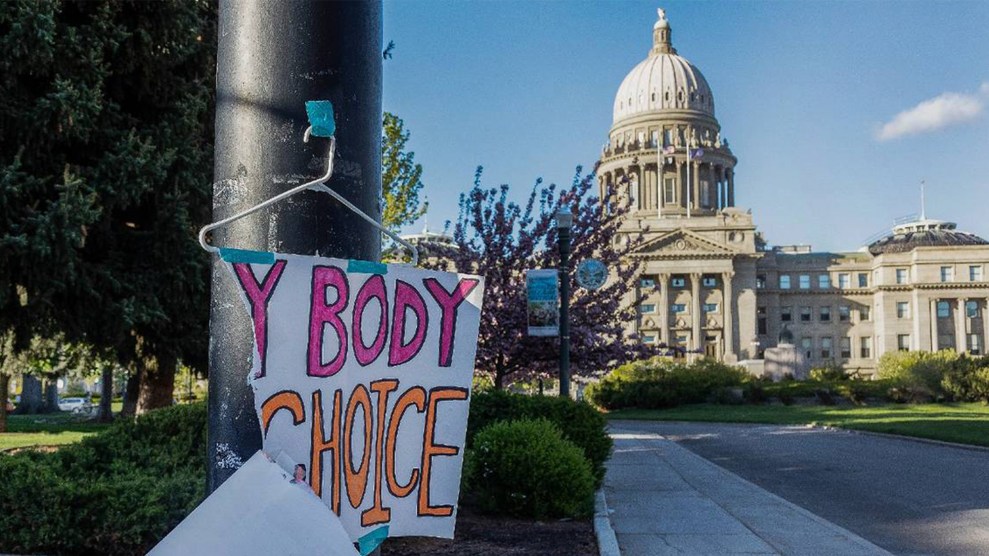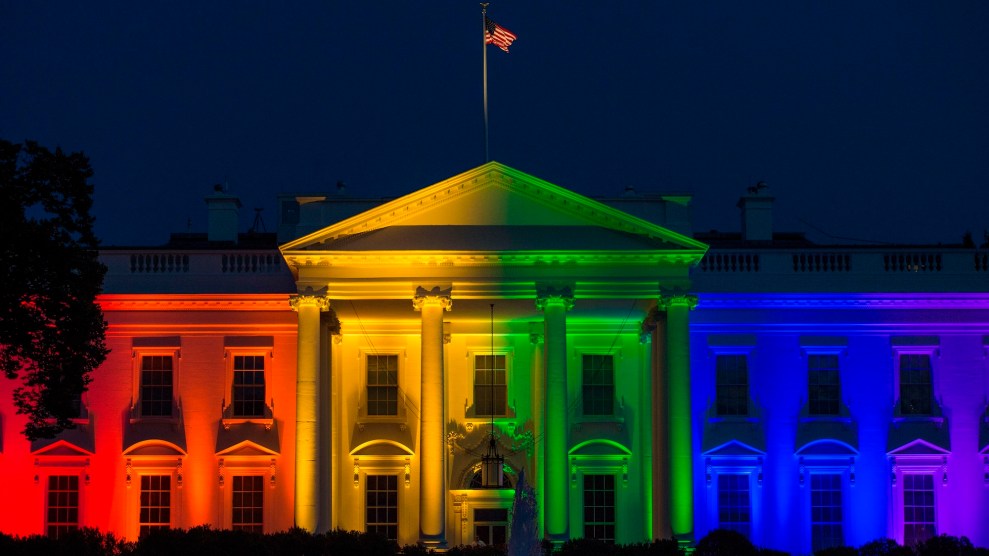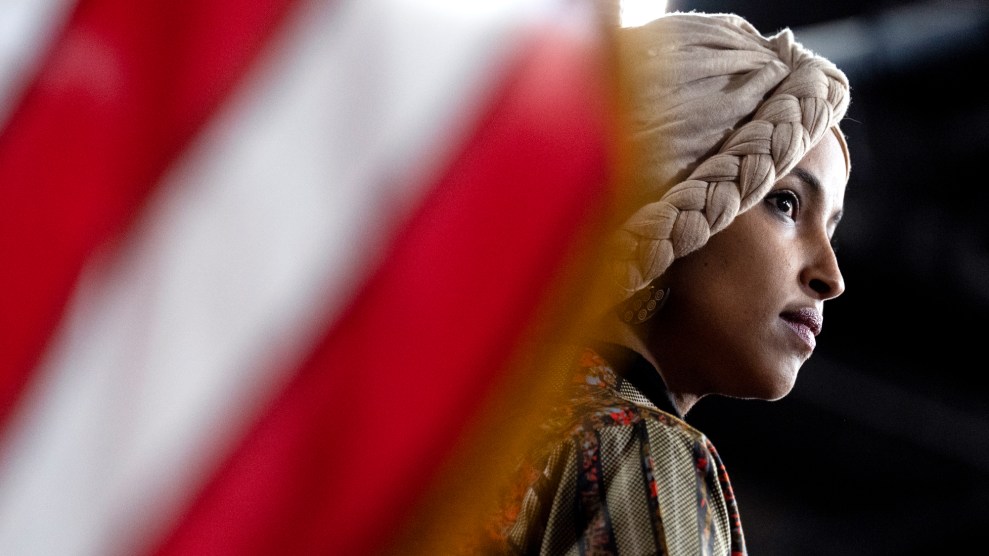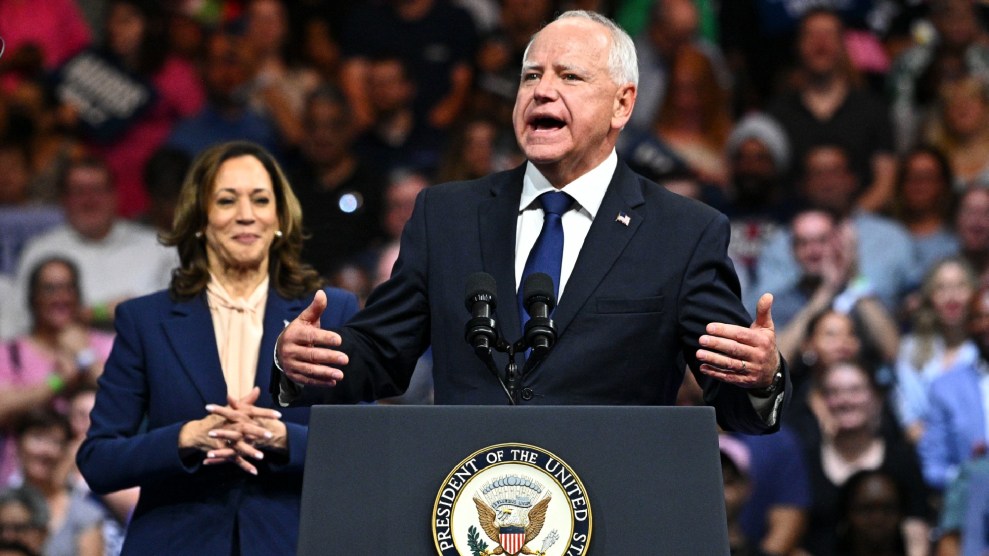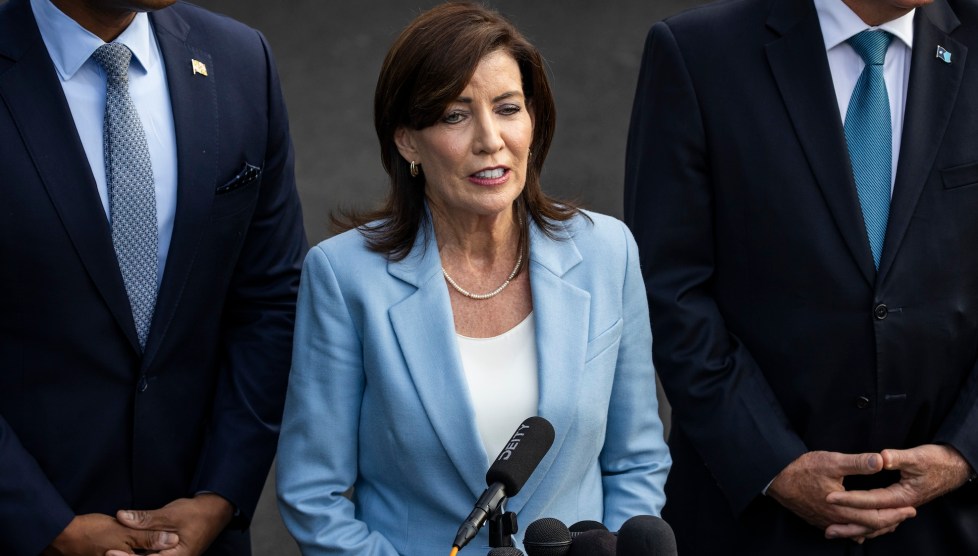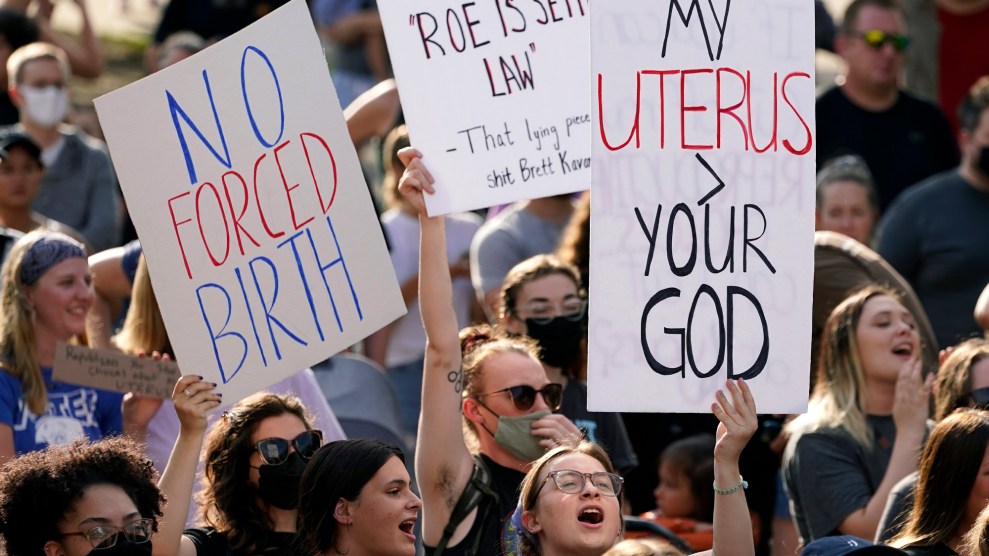
Abortion-rights protesters wave signs and cheer at a rally in Des Moines, Iowa, in 2022.Charlie Neibergall/AP
When the Iowa Supreme Court ruled in 2018 that abortion was a fundamental right to be protected under the most stringent level of judicial review, reproductive justice advocates cheered. Even in a state where Republicans dominated every level of government, it seemed that abortion rights could still prevail—as long as the courts went along.
That didn’t sit well with Iowa’s first woman governor, Kim Reynolds, or her allies in the legislature, who set about rewriting the rules for how justices are picked. Last month, a much-altered Iowa Supreme Court reversed course. In a 4–3 vote, the court effectively upheld the state’s six-week abortion ban by overturning a block on that ban previously imposed by a lower court, thus handing Reynolds a significant, if unsurprising, victory. When the new ban takes effect, likely this week, Iowa will join North Dakota, Indiana, and other Midwestern states facing a drastic curtailment of abortion rights post-Dobbs—and will become the latest example of how conservatives have gamed state supreme courts to restrict reproductive rights and achieve other policy goals.
Reynolds, whose office didn’t respond to Mother Jones’ questions or request for comment, said in a statement after the ruling, “Iowa voters have spoken clearly through their elected representatives,” a sentiment echoed by other Republican lawmakers in support of the six-week ban. But Iowans’ support for the ban has not changed; in fact, multiple polls show a majority believe abortion should be legal in most cases. What has changed since the Iowa Supreme Court established a constitutional right to abortion in 2018 is who sits on the court and how they got there.
“There’s a lot of fear right now,” Alison Dreith, director of strategic partnerships of the Midwest Access Coalition, told Mother Jones shortly after the decision. “It’s already making an impact, and the details of the ruling haven’t even been established.”
State court politicization has been happening for years, of course. But Michael Milov-Cordoba, an attorney in the Judiciary Program at the Brennan Center for Justice at New York University School of Law, says there’s been a “big uptick” in legislative attempts to politicize courts dating back to the 2019 US Supreme Court decision in Rucho v. Common Cause, which closed the door to federal challenges to partisan gerrymandering. By punting the gerrymandering issue to the states, the US Supreme Court incentivized state lawmakers to try to gain political influence over state courts, he says.
Then came the Dobbs decision in 2022, which was “a real watershed moment for state judicial politics,” Milov-Cordoba says. “The public as a whole came to see that state supreme courts would be deciding the extent to which folks in the state would have access to abortion and the contours of that access.” Naturally, what matters most is who is on those courts.
The story of how Iowa’s highest court was transformed dates to 2017, when Reynolds succeeded longtime Gov. Terry Branstad to become Iowa’s chief executive. The election that ushered Donald Trump into the White House also gave Iowa its first Republican trifecta—control of the governorship and both houses of Legislature—in nearly two decades. Reynolds made it her mission to use the GOP’s new power to drastically restrict access to abortion, which was then legal until 20 weeks of pregnancy.
Within a year, the legislature passed, and Reynolds signed, what was then the country’s most restrictive abortion law, banning the procedure after fetal cardiac activity can be detected, or around six weeks after a woman’s last menstrual period. In a May 2018 statement, Reynolds acknowledged the bill would almost certainly be challenged—but she promised that she wouldn’t back down until abortion was banned in Iowa.
By that point, the state’s highest court was already weighing the constitutionality of a different, less onerous law mandating a 72-hour waiting period before patients could terminate a pregnancy. The court eventually struck down the waiting-period requirement, ruling that the state constitution protected a fundamental right to abortion and that any restriction must overcome strict scrutiny, or be “narrowly tailored” to further a “compelling government interest.” That 5–2 decision also doomed Reynolds’ six-week ban. Undeterred, Reynolds said she wouldn’t continue the legal fight. Rather, she would focus on “other ways to advance the cause of protecting the unborn.”
What Reynolds didn’t spell out: Republicans in the state legislature had already devised their own plan to achieve her goal, which involved overhauling the process of who gets appointed to the courts. Within months, Reynolds signed a law giving her majority control over deciding who sits on the commission that nominates justices and appellate judges.
For nearly 60 years, Iowa judges were selected under their bipartisan version of the Missouri Plan, which authorized the governor to select appointees from lists provided by a nominating commission. Judges at all court levels face retention elections after a year on the bench. But in a last-minute addition to a budget bill in April 2019, Republican lawmakers pushed through legislation that removed the chief justice from the commission, instead giving the governor another opportunity to appoint a seat—and shifting majority control to those commission members chosen by the governor.
“We read in scripture that the author of life wants to give ‘a future and a hope’ to all his children. Who are we to stand in his way?”
“This is not a power grab,” Holt insisted on the House floor. “This is a majority party in this chamber exercising our authority when we recognize that changes are needed.”
By the time she signed the bill into law in 2019, Reynolds had already appointed two justices to the Supreme Court. At an annual gathering of the Family Leader—an evangelical Christian dark-money group that, according to its website, seeks to advance “God-honoring, righteous policy” in Iowa—she minced no words. “Elections matter, and fortunately the tide is turning in Iowa’s Supreme Court,” she said. “In two short years, we’ve moved the needle from left to right.”
After the change, Reynolds appointed two more justices. Three years later, a week before the Dobbs decision, the Iowa court handed down a ruling that significantly weakened their 2018 decision, holding that abortion restrictions need not satisfy strict scrutiny to be constitutional. But the splintered opinion didn’t establish what standard of judicial review needed to be employed. The next month, Reynolds named her fifth appointee to the Supreme Court.
But Reynolds still didn’t get the outcome she wanted. In a tie vote in June 2023, after one of Reynolds’ appointees recused herself, the court declined to resurrect the 2018 abortion ban. Incensed, Reynolds convened a special legislative session last July to pass another six-week abortion ban. “We read in scripture that the author of life wants to give ‘a future and a hope’ to all his children,” Reynolds told that year’s Family Leader convention, where she signed the ban into law. “Who are we to stand in his way?”
The state’s abortion providers, Planned Parenthood and the Emma Goldman Clinic, challenged the ban, and a district court quickly blocked it. But this time around, the high court changed course. The majority noted nothing in the “history and tradition” of Iowa’s laws and customs supported a fundamental right to abortion, and that the lower court should employ the rational basis test, which would greenlight abortion restrictions that are “rationally” related to a “legitimate government interest.”
The six-week ban prohibits abortions before as many as a third of women know they’re pregnant. While the law outlines exceptions for reported rape and incest, risk to the patient’s health, and fatal fetal abnormalities, the stories of rape survivors who were denied abortions and women who were forced to leave states like Idaho and Texas to access lifesaving care suggest such exceptions are only theoretical.
Of Reynolds’ five appointees to the high court, only her first, Chief Justice Susan Christensen, voted to reject the six-week ban. In a passionate dissent joined by the two justices who predate Reynolds, Christensen accused the majority of ignoring the sexism underlying the state’s historic abortion bans—and other laws that rendered women “second-class citizens.”
“The only female lives that this statute treats with any meaningful regard and dignity are the unborn lives of female fetuses.”
“The only female lives that this statute treats with any meaningful regard and dignity are the unborn lives of female fetuses,” Christensen wrote. “After that, this statute forces pregnant women (and young girls) to endure and suffer through life-altering health complications that range from severe sepsis requiring limb amputation to a hysterectomy so long as those women are not at death’s door. All in the name of promoting unborn life—or, more accurately, birth.”
It’s not just Iowa lawmakers who are changing the rules of the game.
For years, politicians across the country have set their legislative sights on state judiciaries, looking to manipulate the courts to benefit their policy goals, the Brennan Center’s Milov-Cordoba says. The Brennan Center annually tracks proposed legislation that, in many cases, can weaken judicial independence or aggrandize a majority party’s power. While legislators principally seek to influence the courts through changing judicial selection procedures, Milov-Cordoba says lawmakers have also sought to change judicial ethics commissions or limit courts’ ability to hear certain cases.
In Ohio, for instance, Republican lawmakers threatened to strip state courts of their jurisdiction to hear abortion law challenges after voters constitutionally protected access to the procedure last November. In 2023 alone, the Brennan Center identified 124 bills undermining judicial independence introduced in 29 states, with legislation passing in Utah, Idaho, and Mississippi. Both parties have sought greater political influence over the courts—in 2021, Illinois Democrats pushed through a first-in-decades redistricting plan for Supreme Court races after a Democratic justice lost a retention election. But Milov-Cordoba says efforts in Republican-controlled legislatures dominate overall tallies. “There’s an asymmetry here,” he says.
A lobbyist for the Family Leader has already called for Iowa lawmakers to enact a total abortion ban, according to the Des Moines Register, and GOP lawmakers haven’t ruled out the idea. Meanwhile, the Emma Goldman Clinic—founded the same year Roe was decided and the last independent abortion clinic in Iowa—will continue performing abortions, including as many as possible under the six-week ban, said its executive director, Francine Thompson.
“We’re going to work as hard as we possibly can to help folks get the care that they need between now and when the ban takes effect,” Thompson said at a news conference, adding that the clinic would refer patients out of state when necessary.
Only four Midwestern states have stricter abortion laws than Iowa’s impending six-week ban: Indiana, Missouri, North Dakota, and South Dakota ban it completely. Shortly after the ruling, the Iowa Abortion Access Fund began routing patients needing support to the Chicago Abortion Fund, announcing the two funds had partnered to help Iowans travel east to Illinois, where abortion is legal until fetal viability.
Iowans were already traveling to Illinois and Minnesota for abortions, says Dreith of the Midwest Access Coalition, which provides practical support, including transportation coordination and money for lodging and childcare. But patients were also traveling to Iowa for care—especially from neighboring Missouri, and Nebraska, which has a 12-week ban. In fact, as many as 10 percent of abortions performed in Iowa in 2023 were for out-of-state patients, according to data from the Guttmacher Institute.
Abortion costs have risen exponentially in the past several years, in no small part due to state bans forcing women to travel hundreds of miles to obtain abortions. Those costs will certainly increase as more Iowans will need to go out of state for care. Dreith says before Dobbs, the average support the Midwest Access Coalition provided was about $350 per patient. Now, it’s closer to $1,200. And funneling patients out of states with total or near-total bans racks up a different type of cost, too.
“You have the case of just not enough appointments available to go around post-Dobbs,” Dreith said. “You used to be able to get an appointment within 24 hours, and now, some people are scheduling out weeks—still, two years later—because they can’t meet the demand.”




